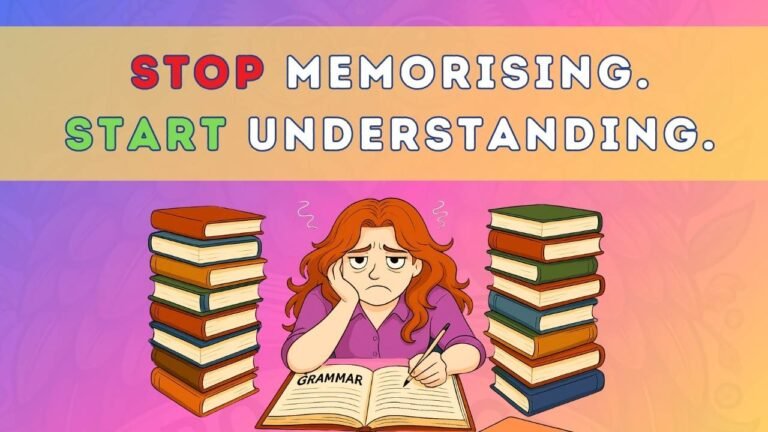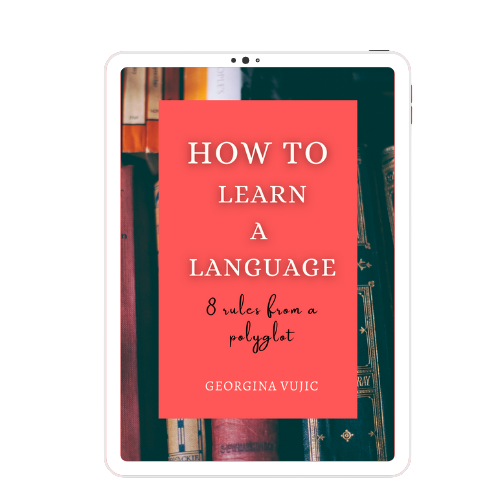Is learning a language as an adult doomed for language failure, or are we overlooking a secret weapon? As parents or teachers, we’re in awe of how quickly children learn to speak. One moment they’re chattering gibberish, and before you know it, they’re expressing themselves like language pros – all without any formal lessons! Meanwhile, the adults among us struggle through extended study periods, desperately striving to master verb tenses and memorize catchy phrases.
But don’t give up hope, dear language learners! This article delves into the mysteries of language acquisition to reveal the truth about learning as an adult.
WHY IS IT THAT CHILDREN PICK UP LANGUAGES EFFORTLESSLY AND ADULTS STRUGGLE?

To answer this question we can look at the songbird. This animal provides an amazing model for studying the neurobiology of language. Using song and vocalization to ensure survival, this bird is genetically wired to develop language skills early in life. Some songbirds even maintain the ability to learn new songs throughout their lifespan. They form new neural cells and synapses during adulthood – talk about incredible!
Humans, like our feathery friends, communicate through vocalization. But unlike songbirds, we have a critical window for learning languages that ends in adulthood.
Let’s face it, picking up a new language later in life is tough. Studies show that individuals under 10 years old can learn languages faster and more easily than adults. Adults need more years of instruction to reach the same level of proficiency.
Let’s look at why it’s harder for adults to learn a second language compared to children.
IMPORTANCE OF NEUROPLASTICITY
When embarking on the exciting journey of learning a new language, adults are faced with a daunting task of competing with years worth of neural pathways that have already been formed by their native language. The brain has already established these pathways, which manifest themselves in various habits such as accent, phrasing and even grammar.
This can be particularly obvious in language sound systems (pronunciation) that appear particularly vulnerable to critical periods of development. Despite mastering a target language’s grammar, many adult learners retain pre-existing pronunciation patterns from their native tongue.
As individuals learn new languages, these previously developed neural pathways may interfere with the learning process, slowing down progress. Modifying these pathways becomes more challenging as we age due to a phenomenon known as neuroplasticity.
Neuroplasticity consists of the brain’s ability to form and reorganize new neural pathways throughout life, depending on new experiences, circumstances and external factors. This capacity is highest in childhood, where the brain is malleable and adaptable, gradually reducing as we grow older.
As if amazing neuroplasticity wasn’t enough, children possess an innate ability to deconstruct language and extract patterns.
CHILDREN’S ACCESS TO INNATE GRAMMAR
Did you know that Noam Chomsky proposed a theory that your brain is hardwired with a “universal grammar”?
This means that you have the innate ability to understand and produce language based on a set of underlying rules. With his generative grammar theory, it’s suggested that we can create and interpret an infinite number of sentences in any language. Incredible, right?
According to this theory, children possess an inborn ability to learn language – it’s deep within their nature! Whenever they’re exposed to the language, their brains instinctively use this inherent grammar to pick out subtleties and rules.
For instance, when a child hears sentences like “The dog barks” and “The girl runs,” they can use their innate grammar to realize that the subject comes before the verb in English.
The more exposure they get, the more their skills develop, becoming ever-more complex – this exciting journey continues as they master language production and comprehension!
Through repeated exposure to various sentences, children can build a mental model of the grammar of their target language.
Generative grammar theory also supports the idea that children have a unique advantage in language acquisition compared to adults. This is due to the so-called critical period hypothesis, which claims that there is a window of opportunity during early childhood when the brain is especially receptive to language learning.
THE CRITICAL PERIOD AND COGNITIVE DECLINE
The Critical Period Hypothesis, coined by Eric Lenneberg in 1967, suggests that the most efficient period to acquire a new language is between the ages of 0-10 years old.
During this pivotal time, a child’s brain is not only more adept at recognising and processing the multiple sounds and patterns of language, but also lacks the predefined neural pathways that we’ve discussed above.
Beyond this period, learning a new tongue becomes exponentially more challenging, and adults must compete with their existing neural pathways, which become more rigid and difficult to modify as we grow older. Therefore, the effort needed to achieve fluency in a second language is much higher than when we are young.
As we age, the brain gradually becomes less able to incorporate new systems of language, leading to a decline in cognitive ability which can negatively affect long-term memory and cognitive performance.
However, adults may take solace in the fact that neuroplasticity is always present, even if to a smaller extent than when someone is younger. Additionally, the mere act of learning a language as an adult has been shown to improve cognitive function and even ward off age-related cognitive diseases.
Furthermore, recent research has shown that adults are still capable of modifying aspects of their neural paths with strategic techniques such as gradual, functional skill training, immersion mindful of grammar and syntax rules, and spaced-repetition, among many others.
Although there are physiological reasons why children are more adept at learning than adults, it’s essential to remember the significant difference in learning objectives and motivation between the two, as well.
DIFFERENT FUNCTIONS AND OBJECTIVES
Language is the gateway through which children integrate into the world. From object labelling to interpersonal communication and self-expression, language acquisition is one of the most vital and motivating aspects of child’s development. Children are tabula rasa, and their brain is programmed for one thing only – learning.
Learning a language as an adult, however, is a different ball game altogether. It’s not just about mastering a new language, but about reforming an entire cognitive framework – word by word.
Moreover, the journey of learning a new tongue is unique to each individual. Varying motivation levels, busy lives, backgrounds, objectives, education and personal experiences make the process harder for us.
USING THE BRAIN DIFFERENTLY
Did you know that neuroscience research shows that adults activate important language areas in their brains while learning a new language? However, the strength of the previous connections in their brain impacts how easily they can learn. That’s why some people have higher language learning aptitude than others.
In contrast, children wire their brains to learn language, and language areas emerge and develop throughout childhood as they learn. It’s like language is built into our brains from the start!
So, how does this affect language learning in adulthood? Rather than building language areas from scratch, adults use their existing brain connections to learn new languages while the child’s brain is wired through the process itself.
IS THERE HOPE? ADVANTAGES OF LEARNING A LANGUAGE AS AN ADULT

The journey to mastering a language is never-ending – even fluent speakers continue learning new words every day. As languages evolve constantly, even natives struggle to keep up! Don’t be put off if you can’t learn as quickly or as easily as children! The challenge of mastering a language is life-long, and even native speakers may fall short in some areas. And part of being an adult is understanding that nothing good comes easy.
Having said that, here are a few advantages you have over children.
YOUR SECRET WEAPON
If you’re picking up a new language or mastering a martial art, forming strong study habits is integral for success in adult learning. Consistent learning is the key for progress.
Did you ever think how adult learning is similar to childhood learning? Just like curiosity pays off for young minds, persistence and discipline pay off for adults taking on new challenges!
While kids have innate learning abilities, adults are gifted with planning and organization. Harnessing those skills is vital.
Setting achievable goals and committing to study habits is the foundation for a winning strategy.
Children have incredible learning power, but they don’t always recognize their full potential until it’s too late. Fortunately, adult learners can rely on hard work and organization to unlock their full capabilities. The sense of achievement that results from this determined effort is far more meaningful than anything children experience. Furthermore, adults gain the unique advantage of understanding the payoff of persistence and diligence.
YOUR MOTIVATION IS POWERFUL
Studying a language in high school might just be another requirement to tick off, but as adults, we’ve got a whole different outlook. We’re motivated by personal goals like talking to locals on trips or communicating with loved ones.
With this kind of drive, language learning becomes more fulfilling as we immerse ourselves more deeply. It’s not just studying for the sake of passing a test, it’s learning for the sake of connecting with others and experiencing new cultures.
You can keep that drive alive by telling your teacher what you want to achieve. They’ll help you stay inspired and offer advice on resources to explore.
YOU WILL UNDERSTAND CULTURAL POINTS BETTER
While children can unconsciously assimilate the finer points of a language, the ability to consciously notice these subtleties is more prevalent in adults.
Learning the subtleties of a language can aid in the assimilation to the culture of that language, in addition to picking up on nonverbal and social cues. And this is where the language really comes alive! This ability can truly help build confidence and knowledge when communicating with locals during travel or in everyday life.
CHOOSING YOUR LEARNING STYLE AND LINGUISTIC VARIETY
One advantage to learning a language as an adult is the ability to choose which language variety to learn.
Adults have the opportunity to learn a language in a way that best suits their needs and interests. This is much different from learning a language as a child, where one is usually exposed to the language spoken by their parents or immediate environment.
Adult learners are free to choose and explore the language variety that they find most enjoyable or beneficial. This could mean learning a variety of the language that is more nuanced, colloquial, or regional.
In addition, adult learners can also choose to focus on specific areas of the language, such as formal or informal speech. Through this flexibility, adult learners can build a more complete understanding of the language and develop more complex language skills.
It’s often said that kids are better language learners than adults. As we’ve seen in this article, they’ve got advantages – like better neuroplasticity, faster cognition, and the ability to subconsciously extract rules at lightning speed. But don’t worry, grown-ups! With motivation and hard work, you can make just as much progress in half the time.
Research suggests adults struggle most with the sound system, but even if you don’t nail the phonology, fluency’s still within your grasp. Here’s a secret: you’ve got something kids don’t – a lifetime of hard-earned wisdom and your ability to stay consistent.
Language learning as an adult has heaps of benefits! You can pick the variety that interests you most and zone in on areas that are relevant to you. Plus, you’re better at spotting the subtleties of the language, adding to your grasp of the culture and customs. With the right push and resources, adult learners like you can gain an in-depth understanding of the language and form lasting connections with other speakers. You know that dedication pays off in more ways than one. So go on, put those smarts to work – and watch your language skills soar!
LEARN SPANISH WITH ROMANCE

Are you a curious, serious, hard-working and committed learner who wants to learn Spanish long-term but you don’t know where to start nor whom to believe?
You’ve wasted money on crash courses and language apps, spent years “picking up” Spanish, doing language exchanges, immersing yourself, and paying “repeat after me” tutors, yet you still struggle to use it functionally and effectively?
Maybe you spend hours listening to music and watching movies in Spanish, but none of it ever really sticks?
You think there is something wrong with you if you are not fluent after a year?
You lack structure, continuous support and confidence?
Maybe you just want expert guidance and honest, regular feedback?
If you can relate to our students, maybe we could be just what you are looking for and as we open our 2023 enrolments, let us show you how learning occurs RLC!
We are not for everyone, but we might be just for you!

















